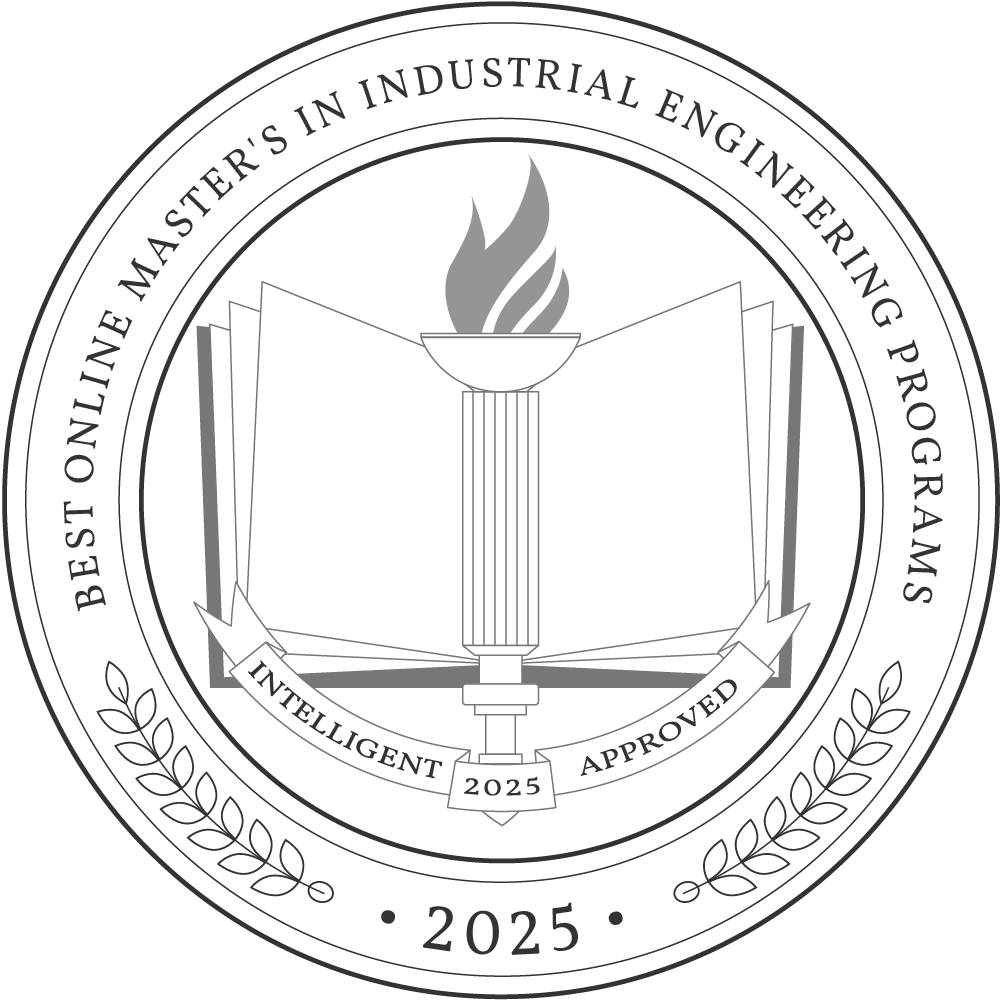Students who complete an online master’s in industrial engineering will learn more about the specialized skills necessary for an advanced career in this field. Most of these online programs are only 30 credit hours, which full-time students can complete within two years or, via accelerated programs, in as little as one year.
According to the National Center for Education Statistics, the average cost of tuition for graduate school is $20,513 per year. Once students graduate, they may qualify for a position as an industrial engineer, where they can expect to receive an average salary of $99,380.
Why Trust Us
The Intelligent.com Higher Education Team is dedicated to providing students with independent, equitable school and program rankings and well-researched resources. Our expert-driven articles cover topics related to online colleges and programs, paying for school, and career outlooks. We use data from the U.S. Department of Education’s College Scorecard, the National Center for Education Statistics, and other reputable educational and professional organizations. Our academic advisory team reviews content and verifies accuracy throughout the year for the most current information. Partnerships do not influence rankings or editorial decisions.
- Analyzed over 2,000 national, accredited, and nonprofit colleges and universities
- 800+ rankings pages are reviewed and updated yearly
- Content is informed by reputable sources, surveys, and interviews with academic advisors and other experts
- Over 100 data points are reviewed for accuracy and quality throughout the year, including sources
How we rank schools
Our list features the best online Industrial Engineering degree programs at top colleges nationwide. Each school featured is a nonprofit, accredited institution — either public or private — with a high standard of academic quality for post-secondary institutions.
We evaluated each school’s program on tuition costs, admission, retention and graduation rates, faculty, reputation, and the student resources provided for online students. We collected data from trusted sources like the National Center for Education Statistics, individual school and program websites, school admissions counselors, and other data sources. Then, we calculated the Intelligent Score on a scale of 0 to 100 based on the following criterion:
Academic Quality:
- Admission rate versus enrollment rate
- Retention rate of students who return after year one
- Accreditation status (regional and programmatic)
- Nonprofit status, both private and public institutions
Graduation Rate
- Overall graduation rate
- Total number of currently enrolled students, including diversity metrics
- Student-to-faculty ratio
Cost and ROI
- In-state and out-of-state per-credit tuition rates and fees
- Required credits to graduate
- Earning potential after graduation
- Availability of federal student loans, scholarships, and other financial aid options
Student Resources
- Available student services for online-only and hybrid programs
- On-campus amenities like tutoring centers and the number of libraries
Read more about our ranking methodology.
Best 30 Accredited Online Master’s in Industrial Engineering Programs
FiltersInstitution Type
Status
- Intelligent Score
- Alphabetically By University Name
- Acceptance Rate
- Enrollment
- In-state Graduate Tuition
- Out-of-state Graduate Tuition
- In-state Undergraduate Tuition
- Out-of-state Undergraduate Tuition

Georgia Tech
Intelligent Score: 99.79In-state: $28,106
Out-of-state: $49,218
In-state: $27,898
Out-of-state: $27,898
SAT: 1370-1530
ACT: 31-35
Georgia Institute of Technology’s Master of Science in Industrial Engineering program has a curriculum that emphasizes modeling, analysis, and solving problems arising in the traditional domains of manufacturing, warehousing, and supply chain systems. The degree requires 30 credit hours, and 9 are reserved for elective courses that enable you to specialize in areas like operations research, statistics, management, or mechanical engineering. Whether you intend to enter the job market directly after graduation or to pursue a doctoral degree, this program can be a good fit. Georgia Tech’s industrial engineering program has a strong record of placing graduates at some of the foremost companies in the world.
$1,100
Online
Southern Association of Colleges and Schools Commission on Colleges
30

Purdue University
Intelligent Score: 99.50In-state: $9,208
Out-of-state: $28,010
In-state: $9,208
Out-of-state: $9,208
SAT: 1170-1420
ACT: 25-33
Purdue University’s Master of Science in Industrial Engineering program is ranked #1 among online industrial engineering master’s programs by U.S. News & World Report. The 30-credit curriculum allows you to choose one of two degree paths: Master of Science in Industrial Engineering (MSIE) or an Interdisciplinary Master of Science in Engineering (MSE/MS) with a concentration in industrial engineering. Curricular options are flexible and varied, which is why you work with an academic advisor to craft a plan of study for your degree. The program is designed for working professionals and is flexible enough to allow you to take time off if needed. Most students begin by taking one course per semester.
Resident: $1,139
Non-Resident: $1,459
Online
Accreditation Board for Engineering and Technology
30-33

University of Illinois at Urbana - Champaign
Intelligent Score: 96.81In-state: $14,317
Out-of-state: $33,824
In-state: $15,016
Out-of-state: $15,016
SAT: 1200-1460
ACT: 27-33
$1,160
Online
Accreditation Board for Engineering and Technology
36

North Carolina State University
Intelligent Score: 95.40In-state: $6,535
Out-of-state: $26,654
In-state: $9,095
Out-of-state: $9,095
SAT: 1230-1410
ACT: 27-32
Resident: $525
Non-Resident: $1,635
Online
Accreditation Board for Engineering and Technology
30

Arizona State University
Intelligent Score: 94.83In-state: $10,710
Out-of-state: $28,800
In-state: $11,720
Out-of-state: $11,720
SAT: 1100-1320
ACT: 21-28
$576
Online
Higher Learning Commission
30

PennState World Campus
Intelligent Score: 93.79In-state: $15,025
Out-of-state: $24,413
In-state: $22,464
Out-of-state: $22,464
SAT: 1070-1300
ACT: 24-29
$1,027
Online
Accreditation Board for Engineering and Technology
30

University of Central Florida
Intelligent Score: 92.23In-state: $4,478
Out-of-state: $19,810
In-state: $6,916
Out-of-state: $6,916
SAT: 1160-1340
ACT: 25-30
In-State: $327
Out-of-State: $1,151
Online
Accreditation Board for Engineering and Technology
30

University of Southern California
Intelligent Score: 91.79In-state: $59,260
Out-of-state: $59,260
In-state: $47,880
Out-of-state: $47,880
SAT: 1340-1530
ACT: 30-34
$2,543
Online
WASC Senior College and University Commission
30

Texas A&M University College of Engineering
Intelligent Score: 91.23In-state: $8,395
Out-of-state: $36,849
In-state: $6,775
Out-of-state: $6,775
SAT: 1160-1380
ACT: 26-32
Texas A&M University Engineering’s ??Master of Engineering in Industrial Engineering program consists of 10 courses (worth 30 credits) that cover the breadth of industrial engineering and essential modeling techniques and tools as well as electives that match your interests. The required courses are Logistics and Inventory Control; Quality Engineering; Human Factors; Engineering Economy; Data Analytics, Models and Tools; Optimization Models and Tools; and Simulation Models and Tools. The remaining three courses are electives either within or outside the industrial engineering department. This is a practice-oriented, non-thesis degree that prepares you to immediately put your education to use in the job market.
Resident: $788
Non-Resident: $1,319
Online
Accreditation Board for Engineering and Technology
30

Johns Hopkins University
Intelligent Score: 90.41In-state: $54,160
Out-of-state: $54,160
In-state: $57,010
Out-of-state: $57,010
SAT: 1470-1560
ACT: 34-36
$1,756
Online, On Campus, Hybrid
Accreditation Board for Engineering and Technology
30

Clemson University
Intelligent Score: 90.36In-state: $14,118
Out-of-state: $37,110
In-state: $10,600
Out-of-state: $10,600
SAT: 1210-1390
ACT: 27-32
$1,033
Online
Accreditation Board for Engineering and Technology
30

Columbia University
Intelligent Score: 90.08In-state: $57,864
Out-of-state: $57,864
In-state: $49,024
Out-of-state: $49,024
SAT: 1460-1570
ACT: 33-35
$2,462
Online
Accreditation Board for Engineering and Technology
30

Texas Tech University
Intelligent Score: 88.84In-state: $8,683
Out-of-state: $20,953
In-state: $6,788
Out-of-state: $6,788
SAT: 1070-1240
ACT: 22-27
$548
Online, On Campus
Accreditation Board for Engineering and Technology
36

The University of Arizona
Intelligent Score: 87.40In-state: $10,990
Out-of-state: $33,273
In-state: $11,938
Out-of-state: $11,938
SAT: 1090-1350
ACT: 21-29
$650 - $1,332
Online
Accreditation Board for Engineering and Technology
30

Iowa State University
Intelligent Score: 85.73In-state: $8,042
Out-of-state: $23,230
In-state: $9,758
Out-of-state: $9,758
SAT: 1010-1310
ACT: 21-28
$818
Online
Higher Learning Commission
30

Auburn University
Intelligent Score: 85.18In-state: $10,080
Out-of-state: $30,240
In-state: $10,080
Out-of-state: $10,080
SAT: 1160-1320
ACT: 25-31
Resident: $612
Non-Resident: $1,836
Online, On Campus
Accreditation Board for Engineering and Technology
31

Mississippi State University
Intelligent Score: 84.31In-state: $8,800
Out-of-state: $23,840
In-state: $8,800
Out-of-state: $8,800
SAT: 1050-1270
ACT: 22-30
$558
Online
Accreditation Board for Engineering and Technology
30

Louisiana Tech University
Intelligent Score: 83.95In-state: $6,401
Out-of-state: $13,143
In-state: $5,416
Out-of-state: $5,416
SAT: 1060-1270
ACT: 22-28
$475
Online
Accreditation Board for Engineering and Technology
36
How to Choose an Online Master’s in Industrial Engineering Program
Choose your area of study
A Master of Science (MS) is the most common graduate degree awarded in industrial engineering. Many online master’s in industrial engineering programs have specialized areas of study for students to choose from. These concentrations typically include manufacturing systems, industrial economics, operations research, production planning, quality engineering and management, and logistics and transportation systems. If you already know what you would like to do after you graduate, look for programs that closely match these career goals.
Research schools and programs
Since many schools offer an online master’s in industrial engineering, prospective students must know how to narrow their choices down.
For starters, you should only apply to institutions that have been approved by a DOE-recognized regional accrediting organization, such as the New England Commission of Higher Education or Northwest Commission on Colleges and Universities. These organizations evaluate schools to ensure they provide students with a high-quality education. Those who attend a school that isn’t regionally accredited may be unable to access financial aid or transfer credits to another institution if needed.
Ideally, your master’s in industrial engineering program will also be accredited by a respected industry group like the Accreditation Board of Engineering and Technology (ABET). This programmatic accrediting organization has particularly high standards for engineering education.
Students may also wish to rule out schools that are out of their price range to reduce post-graduation debt, and students may decide to eliminate any programs that don’t offer the specific area of study they wish to specialize in.
To learn more about any schools that you’re interested in, you can visit the school’s website, contact an admissions counselor, follow the school on social media, or attend an in-person or virtual open house.
Prepare for tests and applications
Application requirements vary by school and program. Many online master’s in industrial engineering programs require students to submit GRE test scores. It’s essential to review whether the application requires these scores and, if so, what the minimum scores in each section must be. If students have never taken the GRE before, they should know it can take up to three months to study, and it may take up to 15 days to receive their results.
In addition to checking on the GRE requirements, students should review applications and verify which additional paperwork is required for each school, which may include undergraduate transcripts, letters of recommendation, and a personal statement. Before submitting an application, always contact an admissions counselor to ensure you have the most accurate information regarding requirements and deadlines.
Select your program
To determine which programs they will apply to, students must consider further criteria to help make their choice(s).
Regarding degrees from similar schools, choosing the more affordable program is acceptable. Students may also apply to programs with impressive job placement rates for graduates. If this information isn’t posted on the school website, an admissions counselor may be able to provide the info. Students may also choose to focus on schools that seem to offer the most support for remote students, as this can ensure they receive the highest-quality education.
Before making your final decision, review your needs and goals again. Do you plan to attend school full-time or part-time? Do you want your program to be as online as possible, or are you fine with a hybrid program that has a fair amount of in-person requirements? Some programs offer asynchronous courses, which can be completed at your own pace, while others only offer synchronous courses, which involve remotely attending lectures and completing assignments at the same time as other students — which of these two online learning formats do you prefer? Your school should accommodate your scheduling needs and learning preferences.
Determine how you’ll pay for your degree
Students worried about how they will pay for their online master’s in industrial engineering degree should fill out the Free Application for Federal Student Aid (FAFSA) each year. After they submit this application, students may qualify for federal student loans, and having it on file can also help students potentially qualify for other forms of aid ranging from grants and scholarships to alternative loans from local banks. For further assistance, students should contact the financial aid office of schools they are interested in to inquire about special aid available through the college or the state. Those who already work in the field should see if their employer offers a tuition assistance benefit as well.
What Can You Expect from an Online Master’s in Industrial Engineering Program?
Students entering an online master’s in industrial engineering program can expect courses that provide advanced instruction in every level of industrial engineering.
They will learn more about the role played by humans and the role played by technology when it comes to engineering tasks, and they will also learn how the integration of man and machine makes modern industrial engineering a reality. Much of the coursework is designed to provide remote students with as much hands-on practice as possible, and these classes foster the creativity needed to develop dynamic problem-solving skills for addressing a wide range of diverse problems.
Typically, students who attend this program full-time can expect to complete all of the required coursework in two years. Students who can only attend part-time will likely complete everything in three years. Should students enroll in an accelerated program, they may be able to complete the coursework in just one year.
Potential courses you’ll take in an online master’s in industrial engineering program
- Human Systems Engineering/Ergonomics. A significant factor in modern design is human comfort, and this course emphasizes the importance of considering the human body when designing future products.
- Operations Research. The primary goal of this course is to teach students to discover the most efficient and effective design solutions. A combination of mathematics and computer-based systems helps students create different operation models and find optimal solutions through trial and error.
- Systems Engineering. This course gives students practical instruction on designing and implementing networks, software, and computer systems. Students will also learn more about identifying system requirements and how to customize working parameters, processes, and system specifications for different needs.
- Interactive Simulation and Training Systems. This course offers extensive instruction in simulation systems, including what those systems require, how to design them, and how to develop them from design to implementation.
What Can You Do With an Online Master’s in Industrial Engineering?
Career outlook
The most logical career path for someone with an online master’s in industrial engineering degree may be an industrial engineer, but this isn’t the only option. Students can choose to go into certain specialties, such as health and safety engineering, or work in management-level positions. Here are some potential industrial engineering career paths:
- Industrial engineer — Design systems to help organizations manufacture products or provide services.
- Median annual salary: $99,380
- Projected employment growth (through 2032): 12%
- New job openings projected: 22,800 annually
- Health or safety engineer — Develop procedures and systems to help prevent illness and injury.
- Median annual salary: $103,690
- Projected employment growth (through 2032): 4%
- New job openings projected: 1,300 annually
- Architectural or engineering manager — Oversee projects in the fields of architecture and engineering, which may include research and development projects.
- Median annual salary: $165,370
- Projected employment growth (through 2032): 4%
- New job openings projected: 13,600 annually
Online Master’s in Industrial Engineering Degree Frequently Asked Questions
How do I apply to an online master’s in industrial engineering degree program?
Students who wish to apply to an online master’s in industrial engineering program may do so by visiting the university website and accessing the online application. That application will specify the different requirements, which typically include submitting a cover letter, undergraduate transcripts, and GRE test scores. The application may also require admissions essays or letters of recommendation.
Students should contact the university’s admissions office to ensure they don’t accidentally leave out any necessary paperwork. An admissions counselor will be able to answer questions and generally verify whether an application is complete.
How much does an online master’s in industrial engineering degree program cost?
The National Center for Education Statistics reports that the average cost of graduate school tuition is $20,513 per year. Private schools are usually more expensive than public schools, and public schools tend to charge out-of-state students a higher tuition rate than in-state students.
How long does it take to earn an online master’s in industrial engineering degree?
Most online master’s in industrial engineering programs can be completed within two years by students attending full-time. If a student can only attend part-time, completing all the required coursework will likely take about three years. Students in an accelerated program may only need one year to earn their degree. Ultimately, students should choose a program with enough support and schedule flexibility to help them balance their academic studies with any additional responsibilities they may have.
Is an online master’s in industrial engineering worth it?
Graduating with a master’s degree in industrial engineering can help you advance your career and improve your earning potential. This degree prepares students to manage large-scale engineering projects and mentor other team members in leadership positions.
Enrolling in an online master’s in industrial engineering degree program provides access to engaging, in-depth coursework, including classes on human systems engineering, operations research, systems engineering, and simulation and training systems. Students will have the opportunity to complete projects and internships with other students and interact with instructors.
An online graduate program in industrial engineering also prepares students for an increasingly global workforce. You will be well-equipped to work on remote or hybrid teams and liaise with coworkers, researchers, and executives around the world.

